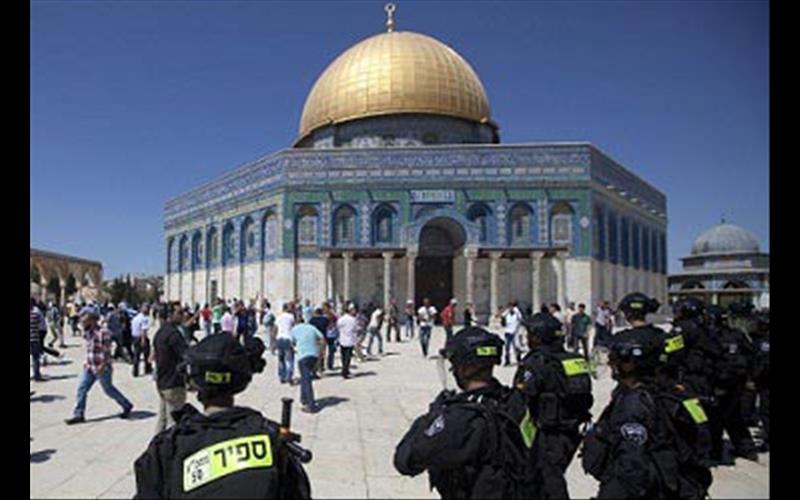Israel Raids Al-Aqsa, Arrests Worshippers

“I call on [Arab and Islamic] states and organizations to stand up to Israel, whose policies at Al-Aqsa Mosque are getting out of hand,” Al-Aqsa Mosque official Sheikh Najih Ibkeirat told Anadolu Agency on Sunday, April 13.
Palestinians' influx to the Muslims' third holiest site on Sunday followed calls by Mufti of Al-Quds Sheikh Mohamed Hussein for Palestinians to camp in the mosque complex in protest against latest violations by extremist Jewish groups.
Ibkeirat called on Palestinians to “stand by Al-Aqsa mosque in the most difficult phase of its history.”
He also urged Palestinians to start a sit-in throughout April at the mosque complex ahead the Jewish occasion of Passover.
Extremist Jewish groups have announced earlier intentions to storm Al-Aqsa mosque compound during Passover holiday, next Monday.
Staging their sit-in inside Al-Aqsa mosque, Palestinians were attacked by Israeli police that fired teargas and rubber-coated steel bullets at Muslim worshippers, injuring several of them.
At least two Palestinian women were arrested in the wake of the attacks.
A different story was shared by the Israeli police, which claimed that protesters started to hurl stones.
“Stones and a number of Molotov cocktails were thrown at police,” Police spokesman Micky Rosenfeld told Agence France Prsse (AFP).
“Police responded by using stun grenades and entered the Temple Mount [Al-Quds] area.”
Al-Aqsa is the Muslims’ first Qiblah [direction Muslims take during prayers] and it is the third holiest shrine after Al Ka`bah in Makkah and Prophet Muhammad's Mosque in Madinah, Saudi Arabia.
Its significance has been reinforced by the incident of Al Isra'a and Al Mi'raj — the night journey from Makkah to Al-Quds and the ascent to the Heavens by Prophet Muhammad (Peace and Blessings be Upon Him).
Terrorist Jews
Sunday’s assault follows an earlier “price tag” attack by Jewish extremists, an extremist tactic used to target Palestinians frequently.
Accusing occupation forces of protecting Palestinians, extremist Jews from Yitzhar settlement vandalized a nearby Israel Defense Forces encampment last Tuesday, April 8.
In the wake of the attack, Israeli authorities scrambled to label them “terrorists”.
“What is going on in the territories is Jewish terror,” Ami Ayalon, a former head of the Israeli intelligence agency Shin Bet, told Yediot Ahronot.
“All of the other definitions coming from the prime minister, from the ministers, or the president — 'hate crime,' ‘bad weeds,' and such — are meaningless. Laundered words. And until they do this, they won’t solve the problem.”
Dubbed “price tag” or “mutual concern” doctrine, the extremist tactic stipulates that settlers respond “whenever, wherever and however” they wish to any government attempt to remove illegally built outposts.
The term is frequently used to describe acts of vandalism by radical Israeli settlers exacting a “price” against Palestinian targets or Israeli security forces in response to actions by the government.
The policy also encourages settlers to vent their anger at innocent Palestinians living in the vicinity of such outposts.
Source: On Islam



